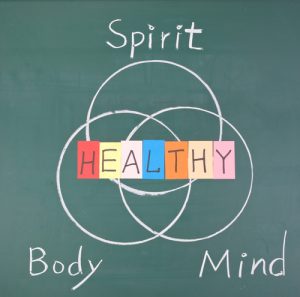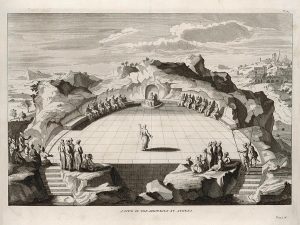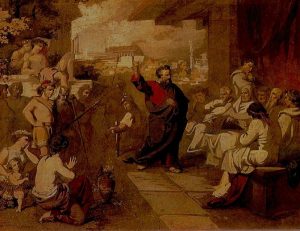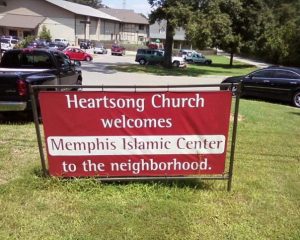
Pastor Rich Knight
Central Congregational Church
April 15, 2018
Acts 17:16-34
In this passage, Paul is in Athens, a very cosmopolitan place in the First Century. It was also a place where people liked to debate and discuss the great issues of the day. Paul has been causing some commotion in the city by his preaching, so they take him to a council that was in charge of monitoring those who spoke in public. This council met on Mars Hill at a courtyard that was created on a rock outcropping on the mountain. That courtyard was called the Areopagus. Paul is speaking here with a very learned crowd. They are not at all part of the Judeo-Christian river that he is swimming in, but he treats them with great respect travis scott air jordan 1 retro low og black olive release date fall 2024. Let’s take a look:

The Areopagus today
Acts 17:16-34
While Paul was waiting for them in Athens, he was deeply distressed to see that the city was full of idols. So he argued in the synagogue with the Jews and the devout persons, and also in the marketplace every day with those who happened to be there. Also some Epicurean and Stoic philosophers debated adidas for big and tall 3 stripes tricot pants size – SchaferandweinerShops KR – ‘Superstar Boot’ sneakers adidas for Originals with him. Some said, “What does this babbler want to say?” Others said, “He seems to be a proclaimer of foreign divinities.” (This was because he was telling the good news about Jesus and the resurrection.) So they took him and brought him to the Areopagus and asked him, “May we know what this new teaching is that you are presenting? It sounds rather strange to us, so we would like to know what it means.” Now all the Athenians and the foreigners living there would spend their time in nothing but telling or hearing something new.
Then Paul stood in front of the Areopagus and said, “Athenians, I see how extremely religious you are in every way. For as I went through the city and looked carefully at the objects of your worship, I found among them an altar with the inscription, ‘To an unknown god.’ What therefore you worship as unknown, this I proclaim to you. The God who made the world and everything in it, he who is Lord of heaven and earth, does not live in shrines made by human hands, nor is he served by human hands, as though he needed air jordan 2 cement grey anything, since he himself gives to all mortals life and breath and all things. From one ancestor he made all nations to inhabit the whole earth, and he allotted the times of their existence and the boundaries of the places where they would live, so that they would search for God and perhaps grope for him and find him-though indeed he is not far from each one of us. For ‘In him we live and move and have our being’; as even some of your own poets have said, ‘For we too are his offspring.’ Since we are God’s offspring, we ought not to think that the deity is like gold, or silver, or stone, an image formed by the art and imagination of mortals. While God has overlooked the times of human ignorance, now he commands all people everywhere to repent, because he has fixed a day on which he will have the world judged in righteousness by a man whom nike air vortex black vintage boots , AspennigeriaShops , Cut in half: Nike Journey Run Review (2024) he has appointed, and of this he has given assurance to all by raising him from the dead.”
When they heard of the resurrection of the dead, some scoffed; but others said, “We will hear you again about this.” At that point Paul left them. But some of them joined him and became believers, including Dionysius the Areopagite and a woman named Damaris, and others with them.

This morning, I’d like us to think about the topic of Healthy Religion vs Unhealthy Religion.
Let me start this way. Picture yourself working in an office at a relatively small business, and one day the manager comes in and says, “We’re going to get a new employee on Monday. And I want you to know, “He’s very religious.” Would you say to yourself in a sarcastic tone, “Oh Boy . . that’ll be fun . . .” Or do you say to yourself, “Gee, that’s great! I love really religious people! They’re so much fun!” I suspect many of us would say, “We’ll just have to see.”
As we think about Healthy Religion vs Unhealthy Religion, let’s first affirm this:
Healthy Religion should give us more joy, not less.
Healthy Religion should help us spread joy, not fear & trepidation.
“The joy of the Lord is our strength,” said Nehemiah.
Jesus of course was a person of great joy. That’s why children flocked to him and wanted to be close to him. Who are children drawn to? Fun, goofy, joy-filled people. Therefore, Jesus was fun, joy-filled and knew how to be goofy!
You know, another thing that’s so clear in the gospels is how Jesus built people up, he made people feel better about themselves, not worse. From Mary Magdalene to Zacchaeus, from the Samaritan Woman at the well to the woman caught in adultery. When people left after an interaction with Jesus, they walked away feeling better about themselves, not worse. Sometimes when we’re with people who are extremely smart or extremely holy in our eyes, we walk away feeling worse about ourselves. We often say to ourselves, “Man, I’ve to pray way more than I do,” or “I’ve got to read much more than I do.” But not so with Jesus.
Healthy Religion builds people up, a Children of God.
Unhealthy Religion makes people feel worse about themselves.
Rabbi Harold Kushner points out that the word “religion” has the same Latin root as the word ligament, which means “to bind” together. The purpose of religion is to bind us together with others. Kushner writes:
“Our place of worship offers us a refuge, an island of caring in the midst of a hostile, competitive world. In a society that segregates the old from the young, the rich from the poor, the successful from the struggling, the house of worship represents one place where the barriers fall and we all stand equal before God.”
That’s what religion promotes – compassion and community, equality and oneness. Healthy religion, that is.
Healthy religion builds community.
Unhealthy Religion builds adversaries.
Unhealthy religion loves to make enemies.
Healthy religion loves to make friends.
Unhealthy religion wages Holy Wars.
Healthy religion works for a Just and Holy Peace.
Within all the religions of the world, there is health and wellness, and there is also unhealthiness and un-wellness. The story of Christianity has had plenty of unhealthy chapters in it – from the Crusades to the Witch Trials – from those who bomb abortion clinics to those who demean gay and lesbian folks and all those in the LGBTQ community, to those who opposed the Civil Rights movement and tried to justify their positions using the Bible.
Healthy Religion recognizes there’s unhealthiness within us all and within our institutions.
And Healthy Religion seeks to combat the unhealthiness in order to make us more whole.
Healthy religion is also respectful of other religions.
Healthy religion sees people of other faiths as fellow travelers on the sacred journey of life.
Acts 17 – The Apostle Paul models that in our text this morning. He’s very respectful of the religious nature of his listeners, even though he disagrees with them and believes he’s offering them something much better.
He has also taken the time to learn about their beliefs. “Athenians, I see how extremely religions you are in every way. I have seen many inscriptions throughout your city. One of them read, “To an unknown God.”

St. Paul in the Areopagus by Mariano Fortuny (1871-1949, Spain)
He’s about to tell them that the “unknown God” has been made known to us in Christ, but he does so affirming the faith that they have. Later on he quotes one of their own poets, “For in God we live, move and have our being. For we too are his offspring.”
He finds common ground. He affirms their faith, all the while being fiercely loyal to his own. There are still many people today who don’t seem to understand that – that you can be fully committed to your Christian faith, while still being open to the truth found in other faiths.
Illustration. Hiking in Acadia, my family & I have learned that there’s more than one way up a mountain. Many of the trails are named for the mountain they’re on – The Gorham Mountain trail, The Acadia Mountain Trial. But some of the mountains are so big that there’s more than one trail that goes to the top.
Listen, God is a big “mountain”! They are at least several ways to the top.
“How do you know which trail is best?”, my sons once asked me. “I’ve read the guide book. I trust this trail.” Which is exactly how I feel about my Christian faith. I’ve read the book. I trust this trail. The unknown God has been made known in Christ.
There’s just one more point I’d like to make about Healthy Religion vs Unhealthy Religion. It’s the biggest and most important contrast of all:
Healthy Religion makes people more loving, not less.
Illustration. I remember a couple that joined my first church in Pennsylvania, Nick & Joan. One day, I bumped into their next-door neighbor, who had an interesting observation to share with me: “They’ve always been nice people. But now that they’re going to church, they’re even more wonderful! They’re just nicer and happier!”
Their comment reminded me of the “Fruit of the Spirit” passage in Galatians (5:22-23). The result of God in our lives, the fruit that produced are “love, joy, peace, patience, kindness, gentleness, goodness and self-control.” That’s what Nick & Joan exhibited.
Illustration. Here’s one other example of a religion that is healthy. Just outside of Memphis, Tenn. there is a Methodist Church by the name of “Heartsong Church.” The land across the street from their church was for sale and it was purchased by an Islamic congregation. The Methodist church knew that this could be a controversial thing in the Bible belt. And so they put a big beautiful sign on their lawn that read,
“Heartsong Church welcomes the Memphis Islamic Center to the neighborhood.”

Doesn’t that strike you as a Christian thing to do?
When the folks at the Heartsong Church found out that the Islamic Center, which is a house of worship, wasn’t going to be finished for Ramadan, do you know what they did? They opened their doors and invited their Muslim neighbors to use their facility for their prayers services during the holy month of Ramadan.
Not everyone in the Heartsong church was thrilled about these gestures of hospitality. They lost 20 members of it. But the church leadership explained it very clearly. “Jesus told us to love our neighbors,” their pastor said, “and these people are actually our neighbors.”

The people at the Christian church even served as greeters when the Muslims came in for Ramadan services. That strikes me as a beautiful expression of healthy religion. The Christians remained thoroughly Christian. And the Muslims remained thoroughly Muslim. But they met as neighbors, fellow travelers on the sacred journey of life. The two congregations have shared meals together, worked at a local homeless shelter together and are building a park together on land that they each own.

Religion ought to make us more loving, not less.
Religion should bring us more joy, not less.
Religion should help heal the world, not divide it.
What the world needs now are Christians who are healthy, whose hearts are full of the love and joy of God.
Let us be those Christians!
Amen and Amen!

